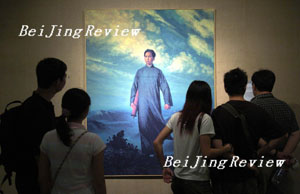| 
His face is no longer ubiquitous in China, but it remains by far the most recognizable. The image of the Great Helmsman, Mao Zedong, is the only one on the country's currency. A massive portrait of him still hangs over Tiananmen Gate, 30 years after his death.
Yu Hai, 38, a basketball teacher at a Beijing middle school, says even his 3-year-old daughter knows who he is. As he put away old magazines recently, he found one with Mao's portrait on the cover. He asked his daughter to guess who the man was, and the toddler answered "Chairman Mao," to the surprise of Yu, who hadn't even taught her about him.
Despite this, Yu said that most children of his daughter's age or a little older are able to recognize banknotes, but not the face on them. "I think my generation, the same with my father's generation, holds an inborn reverence of Mao," said Yu, who was a child when Mao died and couldn't understand how such a deified man could pass away. When Yu was young, he and his friends would swear on Mao's name as if it were that of God.
Countryside connection
Chen Fang, a 53-year-old professor at Renmin University of China, buys old copies of Mao's selected works at the Panjiayuan antique market in Beijing. In 1967, the second year of the "cultural revolution" (1966-1976), the city-born Chen was sent to work in the countryside according to Mao's instructions.
Although it took Chen time and grueling effort to escape from the countryside, he refuses to criticize Mao. Chen insists that Mao's initial intention of sending young people to a harsh environment to refine their temperament remains correct.
During those days in the countryside, Chen had nothing to read but Mao's little red book, Quotations from Chairman Mao Tse-tung. "I practically grew up reciting Mao's sayings and Mao's thinking has always been my source of spiritual strength." Chen said that although he isn't wealthy, he holds a positive attitude toward life in spite of setbacks and difficulties, thanks to the encouragement of Mao Zedong thought, once a mandatory part of daily life for many Chinese.
Mao, the son of a prosperous farmer family, was known for having a special relationship with the Chinese farmers. He started his revolution by cultivating a farmers' movement in Hunan, his home province. Subjects of his early revolutionary doctrines include dividing land among farmers and taking over the regime by first storing strength in the countryside.
"Mao sincerely hoped that all Chinese people could live a happy life, although the actual situations went against his will," said Chen, adding that nowadays Mao is still the most popular among the farmers, many of whom face growing hardship. "Through holding memorial activities for Mao, the farmers hope the gap between urban and rural areas will narrow."
"Mao realized that farmers are revolutionary forces and called on the public to fight against bureaucracy. This is how Mao tried to awaken the democratic consciousness," said Zhang Tianguang, 40, a freelance playwright.
As a student at the Shanghai University of Traditional Chinese Medicine in the 1980s, he was a firm believer in Western democracy. He said he changed his mind later in life after studying Mao's works. "I admire his saying that rebellion is fully justified," said Zhang. Different from the Red Guards during the Cultural Revolution, who understood it as encouragement for violent destruction, Zhang interpreted the line as, "the people's request for liberation is sensible." Zhang sees it as the localization of Marxism by Mao.
Mao as business guru
Ren Zhengfei, the founder of major Chinese telecom equipment provider Huawei, said he reads Mao's works for "the spirit of rebellion," which he believes is important to his company's innovation and development. The nascent company once had to compete with such well-established foreign brands as Alcatel and Lucent, which had dominated the Chinese market for years.
Ren successfully directed the company to grab market share by adopting Mao's military tactic of "using the countryside to encircle cities." He said he even uses Mao's theory of criticism and self-criticism at staff meetings.
Zong Qinghou, founder of homegrown soft-drink giant Hangzhou Wahaha Group, is also a loyal believer of Mao's idea of "using the countryside to encircle cities." This is how he developed his company, by first occupying the market of rural areas. Future Cola, a carbonated drink the company designed for the domestic market, has broken the monopoly of Pepsi and Coca-Cola since its launch in the late 1990s. Zong's management style is quite bossy, which he admitted is "learned from Mao."
| 